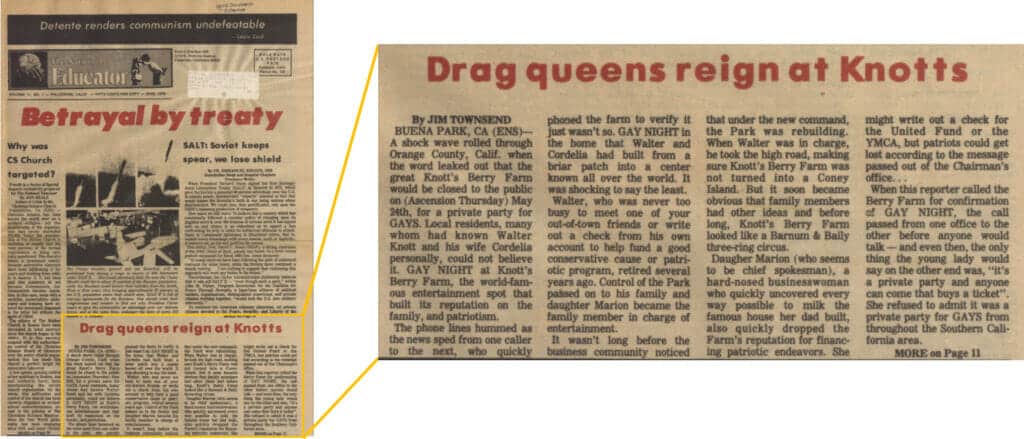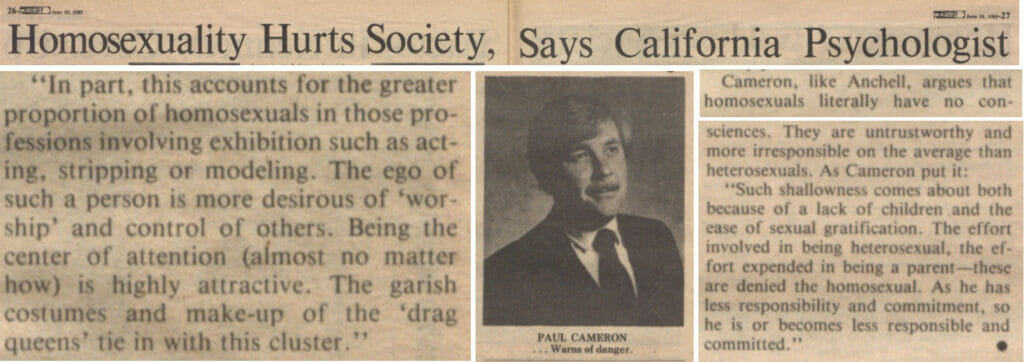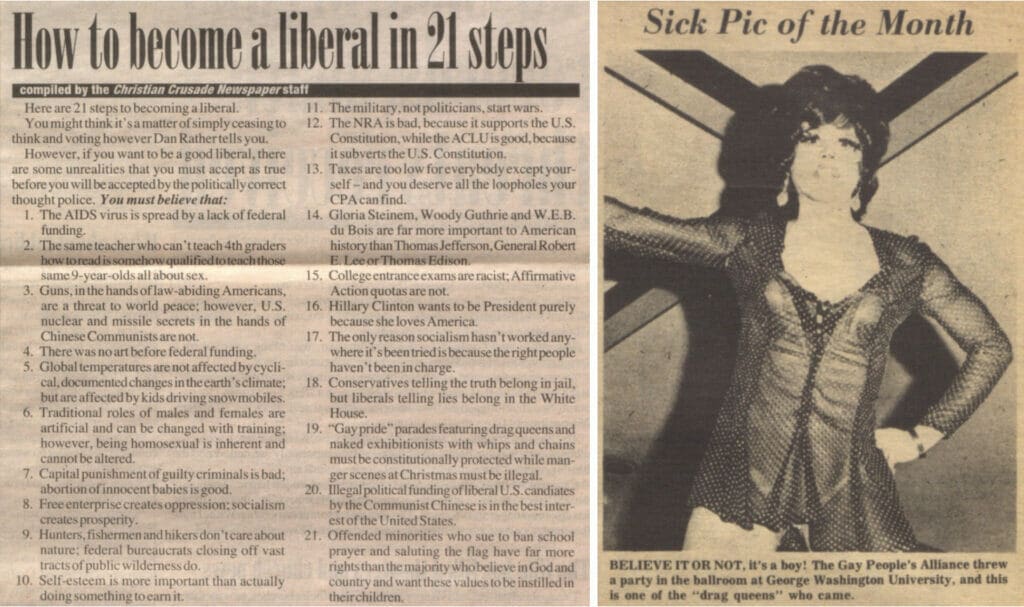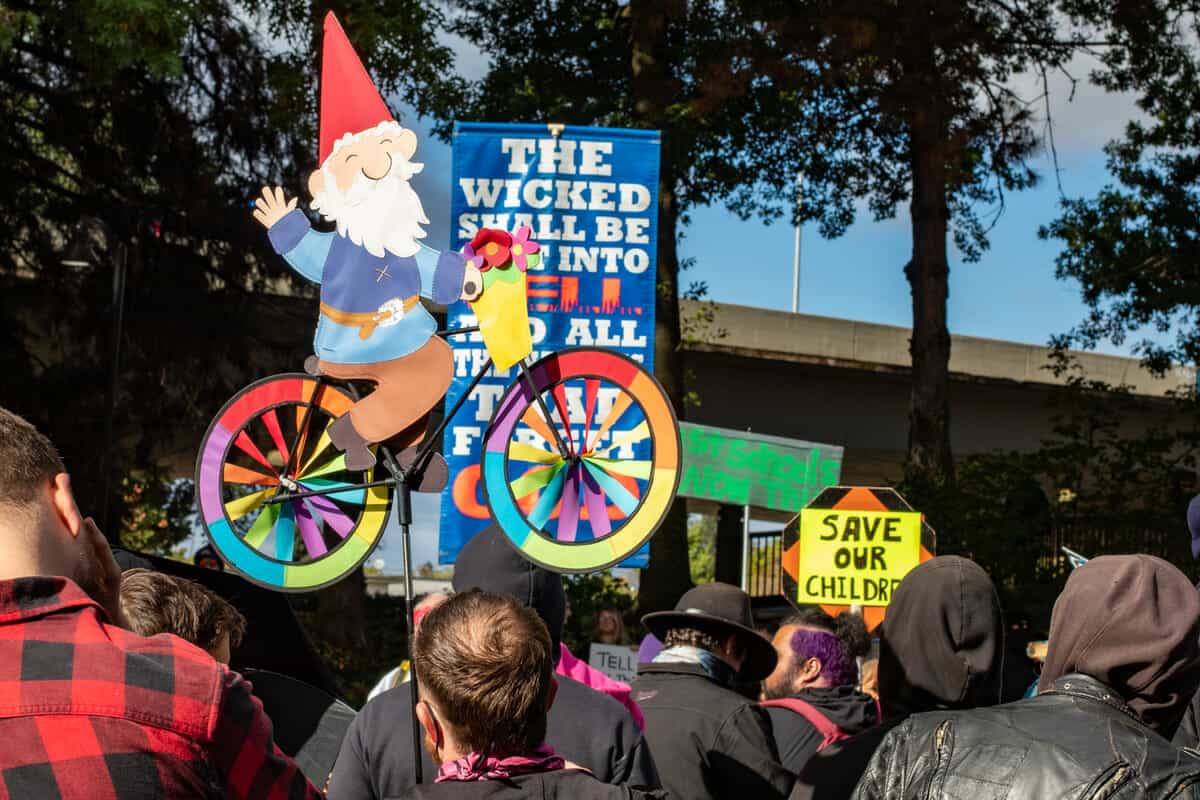Disclaimer: This blog post is written by an undergraduate student. Becca uses materials from Gale’s Political Extremism and Radicalism: Far-Right Groups in America archive which contains visual and textual material representing various historical viewpoints related to race, gender, sexuality, terrorism, and other subjects, including terminology and concepts that may be considered offensive by modern standards. These materials are provided for academic research and teaching purposes. Gale’s expert editorial staff includes this content within this archive at the recommendation of our source library partners and scholarly advisors and does not endorse any specific views contained within the content.
│By Becca Leeland, Gale Ambassador at the University of Exeter│
I love drag. I’ve been to loads of shows, and now that season 15 of RuPaul’s Drag Race is over (Anetra was my winner), I’m going to have to find something else to do with my Saturday evenings. I love the joy and self-celebration that sits at the heart of drag, but what I love even more is that this is not seen as antithetical to their power as activists.
US drag is currently being targeted by Republican legislation, with Tennessee becoming the first state to ban drag performances in public spaces, with fourteen other states introducing similar restrictions.1 Drag in its entirety is being branded as ‘adult content,’ including the ‘Drag Queen Story Hour’ programme, an initiative promoting reading and diversity in which drag queens read children’s books in public libraries. The dangerous conflation often made between the LGBTQ+ community and paedophilia is a well-established rhetoric tool of social conservatives, so I decided to explore Gale’s Political Extremism and Radicalism: Far-Right Groups in America archive, to dive into the legacy of the demonisation of drag queens.
Across the sources I found, there are three major themes which attempt to justify the threat of drag: their cultural threat, their threat to social order, and their profligate spending and indulgence.
The American Dream
Much of the demonisation of drag comes from anxiety about the nuclear family, and what conservatives believe to be the tenets of American culture – and by extension accusing drag queens of actively debasing this. An article from The National Educator in 1979 reported how Knotts Berry Farm was closed for a ‘private party for GAYS,’ and repeatedly outlines a sense of betrayal, that ‘those in charge would destroy the family image that Walter Knott worked so hard to build,’ and their values of ‘family, and patriotism.’

Continued: https://link.gale.com/apps/doc/DWZQUU806687293/PLEX?u=exeter&sid=bookmark-PLEX&xid=3b23dd4c&pg=84.
Similarly, when Senator Jesse Helms (Republican, North Carolina) came under fire from gay and black activists in the 1980s, the editor of The Citizen, George W. Shannon, accused drag queens of flaunting ‘their degeneracy so blatantly,’ and lamenting that the word ‘gay’ no longer had the ‘normal sense of the word.’ Shannon goes on to state Helm’s view that ‘the perverts and their appellation of the term ‘gay’ are debasing to American language, culture and morals.’
In what proved to be a difficult article to read, in 1985 right-wing newspaper The Spotlight printed the views of Dr Paul Cameron, psychologist and founder of the Family Research Institute (which has been condemned as an anti-gay hate group, and Cameron himself was expelled from the American Psychological Association after an ethics review). He wrote that, as a result of drag, ‘hyped by a liberal media and supported by economic situations that see the homosexual community as having ‘special benefits,’ the clear benefits to society of family living evidently need to be stated.’ Despite presenting no evidence to support his assertions, Cameron holds drag responsible for a perceived collapse of American values.
Drag as Danger
Far-right conservatives have asserted that drag is dangerous as it threatens social order, from paedophilia, to AIDS, to being a quasi-eugenic hazard. The article defending Jesse Helms mentioned above also condemned drag queens as ‘a major health menace, what with their peculiar susceptibility to the mysterious new disease known as ‘AIDS.’’ In this depiction, drag queens are not American citizens in desperate need of health care and institutional support, nor the victims of AIDS, but agents to its proliferation and thus worthy of discrimination and hate.
In 2006, far-right publication The Remnant included an egregiously misleading reference to drag queens when they reported the policies of the Dutch Naastenliefde, Vrijheid en Diversiteit (NVD) [Charity, Freedom and Diversity Party]. This party advocated for a reduction of the age of consent to twelve years old, the legalisation of child pornography and bestiality. The problem lies in the way the article intertwines discussions of the NVD with After the Ball, a seminal piece of literature evaluating the roots of American homophobia and how to combat it, as this again places the LGBTQ+ community in alarming proximity with child molestation. Indeed it is significant that the author decided to include quotes from After the Ball which reference ‘cocky mustachioed leather-men, drag queens, and bull dykes’.
In The Spotlight in 1985, Dr Cameron’s justification for the danger of drag queens bordered on the eugenic – that their inherent qualities of narcissism inure them to ‘exhibitionism such as acting, stripping or modelling,’ and ‘the garish costumes and make-up of the ‘drag queens’ tie in with this cluster.’ With jaw-dropping casualness, Cameron asserted his psychological belief that ‘homosexuals literally have no consciences,’ and thus will do all manner of damage to society with no remorse. This technique is fear-mongering at its epitome, and creates the drag artist as a bogey-man threatening American health, children, and genetic safety.

Filthy Rich
Having appealed to moralism and patriotism, far-right conservatives have also appealed to capitalism. Enforcing the stereotype of an indulgent and profligate LGBTQ+ community, Jesse Helms suggested that they are rolling in taxpayer money, that ‘$640,000 in tax money has gone to an LA ‘Gay and Lesbian Community Services Centre,’ both implying that his supporters’ money is being stolen and wasted, and that the LGBTQ+ members are not citizens entitled to public funding. Similarly, The National Educator piece pictured above, in a closing remark, says that ‘the Berry Farm are going to find that catering to GAYS also has a price tag.’

Right: National Youth Alliance. National Vanguard (Attack!). September 21, 1969-October, 1972. MS Social Documents Collection Box 603 Folder 5. University of Iowa. Political Extremism and Radicalism, https://link.gale.com/apps/doc/CRFBZC445209217/PLEX?u=exeter&sid=bookmark-PLEX&xid=52230771&pg=76
The Importance of Access to these Archives
The significance of the historical demonisation of drag queens is that it remains remarkably unchanged today; the longevity of accusations against the art as endangering society, children and social order is striking as none of these fears have come to pass, yet the conservative voice has not been silenced. Fifty years after the Stonewall riots, seen as the start of the modern LGBTQ+ movement as we know it, and the mainstream visibility of gender non-conformity, we see the same fears about drag expressed over and over by the American right-wing but never realised, showing the threat is not real, and is instead a moral bogey-man.
America’s right and far-right tendencies have proven to be a salient trend in American political culture, and underscores the importance of access to archives such as Gale’s Political Extremism and Radicalism: Far-Right Groups in America in tracing their legacy.
If you found this piece interesting, you may like to try:
- Can Digital Humanities teach us more about Political Extremism?
- Pride and Protest: LGBT+ Disability Activism in the US, 1985-1995
- Using Primary Sources to Study Gun Control
- Political Extremism and Radicalism in the Twentieth Century – a new archive
- Political Extremism and Radicalism archive: Why create it and why is it important now more than ever?
- The Power of Voice: Oral Histories in Gale’s Political and Extremism and Radicalism archive
- How to Make Use of British Security Service Documents
- Free Speech in a “Post-Truth” Era – The Value of Digital Archives
Blog post cover image citation: ‘Drag Queen Story Hour Protest’, 24 October 2022. Image by David Geitgey Sierralupe, available on Wikimedia Commons. Original Source Flickr: https://www.flickr.com/photos/66136677@N00/52451716467/
- Burga, Solcyre. “Tennessee Passed the Nation’s First Law Limiting Drag Shows. Here’s the Status of Anti-Drag Bills Across the U.S.” Time, April 3, 2023. https://time.com/6260421/tennessee-limiting-drag-shows-status-of-anti-drag-bills-u-s/.


